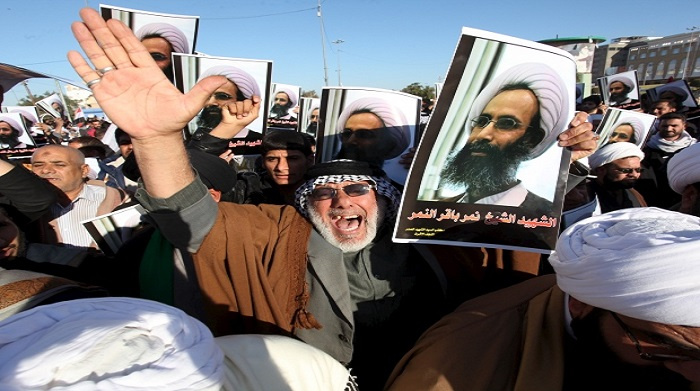Call for Restraint, Tilt toward Iran

After a row between Iran and Saudi Arabia over the execution of prominent Shiite cleric and activist Sheikh Nimr al-Nimr escalated, a handful of Arab countries severed ties with Iran following suit as Saudis ended their diplomatic mission in Iran in reaction to storming of their embassy in Tehran. Riyadh accuses Iranian police of negligence in providing security to the diplomatic site, despite Saudi Arabia’s warnings in advance. Iran’s top leaders have pledged to bring the attackers to justice. Bahrain, Sudan, and Djibouti cut diplomatic relations with Iran on Monday while the United Arab Emirates downgraded its ties to charge d’affaires level “in light of Iran's ongoing interference in internal (Gulf Cooperation Council) and Arab affairs that has recently reached unprecedented levels,” according to a government statement.
An urgent meeting of Arab League representatives slated for next Sunday, to discuss the so-called interventions of Iran in the internal affairs of Arab countries, has raised estimations that the domino of severed ties with Iran would continue to fall on other Arab countries allied with the Saudis such as Kuwait, Nigeria, and Tunisia.
In the meantime, world leaders have expressed concern regarding the skirmish between the sides, calling for restraint and direct talks. Russia released a statement calling for restraint between Iran and Saudi Arabia. “Moscow is concerned about escalation of the situation in the Middle East with participation of the key regional players,” the Russian foreign ministry said Monday. Russia asked the sides to “show restraint and to avoid any steps that might escalate the situation and raise tensions including interreligious ones.”
China’s foreign ministry also said it is paying close attention to the events and hopes “all parties can remain calm and restrained, use dialogue and negotiations to properly resolve differences, and work together to safeguard the region's peace and stability,” according to CNN.
In a more actively involving statement, German Vice Chancellor Sigmar Gabriel warned Saudi Arabia yesterday that Germany would review its sales of military equipment to Riyadh following the mass execution.
“We must now review whether in future we should take a more critical stance” on selling arms to Saudi Arabia, Gabriel, who is also Germany’s economy minister, said on Monday, as quoted by PressTV.
The US administration also said on Monday it had warned Saudi Arabia in advance about damaging consequences that would follow the execution of Shiite cleric Sheikh al-Nimr.
“There have been direct concerns raised by the US to Saudi officials about the potential damaging consequences of following through on the execution, on mass executions, in particular, the execution of al-Nimr”, White House spokesman Josh Earnest said on Monday.
“We do continue to be concerned about the need for both the Iranians and the Saudis to de-escalate the situation. We are urging all sides to show some restraint and to not further inflame tensions that are on quite vivid display in the region,” he stated.
United Nations Secretary-General Ban Ki-Moon has phoned the foreign ministers of Saudi Arabia and Iran to urge both countries to avoid actions that could further exacerbate tensions after the recent Saudi executions, the attack on the Saudi embassy in Iran, and the rupture in diplomatic ties. In his call to Saudi Foreign Minister Abel bin Ahmed Al-Jubeir, Mr. Ban reiterated his views on capital punishment, which he strongly opposes, and his disappointment at the execution of Sheikh Nimr Baqir al-Nimr, whose case he raised with the Saudi authorities several times.
He also reiterated that the attack on the Saudi Embassy in Tehran was deplorable, but added that the announcement of a break in Saudi diplomatic relations with Iran was deeply worrying. Regarding Yemen, he urged Saudi Arabia to renew its commitment to a ceasefire.
Speaking to Iranian Foreign Minister Javad Zarif, Mr. Ban recalled his earlier statement voicing dismay at Saturday’s execution of Sheikh al-Nimr and 46 other prisoners by Saudi Arabia, as well as his condemnation of the attack on the Saudi embassy in Tehran, and he urged the Minister to take the necessary measures to protect diplomatic facilities.
In a statement issued by the Swiss foreign ministry on Monday, the ministry said it had summoned the Saudi Arabian chargé d’affaires to explain Switzerland’s principled opposition to the use of the death penalty. “These mass executions risk reigniting sectarian tensions which have already caused too many victims in the region,” the statement said.
In a statement issued on Sunday, Canadian Foreign Affairs Minister Stephane Dion says Canada is calling on the Saudi Arabian government to “protect human rights, respect peaceful expressions of dissent, and ensure fairness in judicial proceedings.” Dion says Canada is particularly concerned that the country's execution of Sheikh Nimr al-Nimr could “further inflame” sectarian tensions in the region. Dion says Canada is urging authorities and leaders in Saudi Arabia and Iran to work to defuse tensions and promote reconciliation.
British Prime Minister David Cameron said Monday tensions between Iran and Saudi Arabia were “hugely concerning” and condemned the death penalty following Riyadh’s controversial execution of a Shiite cleric.
“It is hugely concerning because of course we want to see stability in the Middle East... not least because that will be absolutely essential for solving the crisis in Syria which is the source of so many of these problems,” Cameron said on a visit to east London. “We condemn and do not support the death penalty in any circumstances and that includes Saudi Arabia.”

